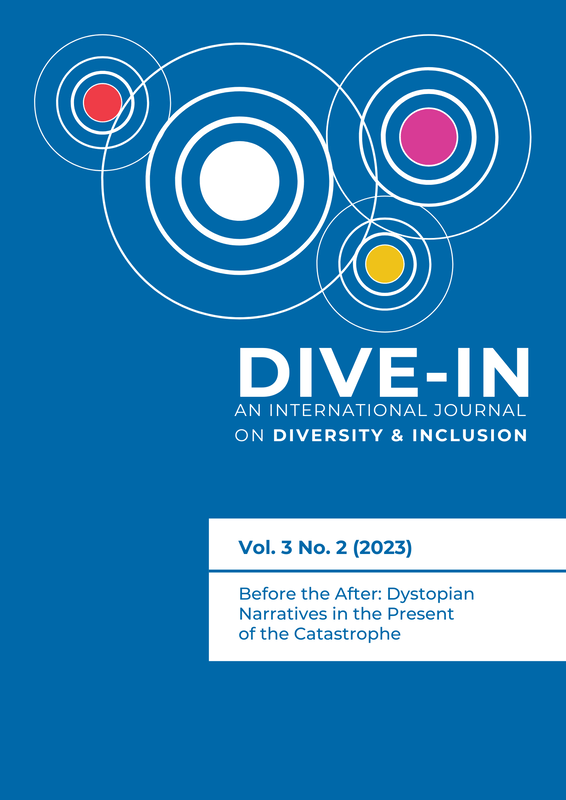A speculative fjord: The global and the planetary in the depiction of Killary Harbour in Notes from a Coma (2005) by Mike McCormack and The Fjord of Killary (2012) by Kevin Barry
DOI:
https://doi.org/10.6092/issn.2785-3233/19136Keywords:
Irish literature, speculative fiction, global, planetary, capitalist world-ecologyAbstract
The present paper aims at analyzing two works of contemporary Irish fiction, namely, Notes from a Coma (2005) by Mike McCormack and The Fjord of Killary (2012) by Kevin Barry. I argue that both works not only mirror what Dipesh Chakrabarty calls the ‘global’ and the ‘planetary’, but also reflect the non-human space and time scales that Timothy Morton identifies as one of the properties of hyperobjects. Moreover, the two novels are deeply rooted in the history of Ireland, and especially in the semi-peripheral position occupied by the country within the capitalist world system. The intermingling of various narrative layers together with speculative and realistic tropes conveys the epiphenomenality of our lived experience, characterized by the not-yet predictable consequences of planetary climate crisis and the ever-shifting demands of global capitalism.
References
Barry, Kevin. 2013. Dark Lies the Island. London: Vintage Press.
Chakrabarty, Dipesh. 2021. The Climate of History in a Planetary Age. Chicago & London: The University of Chicago Press.
Chakrabarty, Dipesh. 2023. “Capitalism, work, and the ground for planetary histories: a speculative argument.” Deutsche Vierteljahrsschrift für Literaturwissenschaft und Geistesgeschichte 97, 33–39.
Clark, Timothy. 2012. “Scale.” In Tom Cohen (ed.), Telemorphosis: Theory in the era of climate change, 148–166. London: Open Humanity Press.
Clark, Timothy. 2015. Ecocriticism on the Edge, The Anthropocene as a threshold concept. London: Bloomsbury Academic.
Coakley, Maurice. 2012. Ireland in the World Order: A History of Uneven Development. London: Pluto Press.
Crutzen, Paul J., & Eugene Stoermer. 2000. “The Anthropocene”. Global Change Newsletter 41, 17.
Deckard, Sharae & Stephen Shapiro (eds.). 2019. World Literature, Neoliberalism, and the Culture of Discontent. London: Palgrave McMillan.
Deckard, Sharae. 2014. “The IFSC as a Way of Organizing Nature': Neoliberal Ecology and Irish Literature.” Irish Studies & The Environmental Humanities 11.
Deckard, Sharae. 2016. “World-Ecology and Ireland: The Neoliberal Ecological Regime.” Journal of World-Systems Research 22, 145–176.
Fagan, Honor. 2002. “Globalization and Culture: Placing Ireland.” The ANNALS of the American Academy of Political and Social Science 581(1), 133–143.
Flannery, Eoin. 2022. Form, Affect and Debt in Post-Celtic Tiger Irish Fiction. London: Bloomsbury Academic.
Horton, Zach. 2017. “Composing a Cosmic View: Three Alternatives for Thinking Scale in the Anthropocene.” In Michael Tavel Clarke & David Wittenberg (eds.), Scale in Literature and Culture, 35–60. Cham: Springer Nature.
Keegan, Colm. 2018. “Ireland Is”. UCD Library Special Collections, 5 December 2018, (https://www.youtube.com/watch?v=7vieYaFnwxM). [Last access on 21/07/2023].
Kelleher, Margaret. 2022. “Famine and Ecology, 1750-1900.” In Malcolm Sen (ed.), A History of Irish Literature and the Environment, 115–133. Cambridge: Cambridge University Press.
Kelly, Adam. 2020. “Ireland’s Real Economy: Postcrash Fictions of the Celtic Tiger.” In Paige Reynolds (ed.), The New Irish Studies, 195–210. Cambridge: Publisher: Cambridge University Press.
Keohane, Kieran, & Carmen Kuhling. 2004. Collision Culture: Transformations in Everyday Life in Ireland. Dublin: The Liffey Press.
Keohane, Kieran. 2017. “At Swim-Two-Birds Again: How to Read What Is to Be Read (And How the Real Returns to its Place!).” CJIS 40, 195–219.
Kirby, Peadar. 2010. Celtic Tiger in Collapse: Explaining the Weaknesses of the Irish Model. London: Palgrave Macmillan.
Kitchin, Rob, Cian O’Callaghan, Mark Boyle, & Justin Gleeson. 2012. “Placing neoliberalism: the rise and fall of Ireland’s Celtic Tiger.” Environment and Planning 44, 1302–1326.
Latour, Bruno. 2017. Facing Gaia. Cambridge: Polity Press.
Lewis, Simon L. & Mark A. Maslin. 2018. The Human Planet: How We Created the Anthropocene. New Heaven: Yale University Press.
Löwy, Michaël. 2009. “L'irréalisme critique.” Actuel Marx 45 (1), 52–65.
Malvestio, Marco. 2022. “Theorizing Eco-Dystopia: Science Fiction, the Anthropocene, and the Limits of Catastrophic Imagery.” European Journal of Creative Practices in Cities and Landscapes 5, 25–37.
McCann, Gerard. 2013. “The ‘Celtic Tiger’ in Hindsight.” Nordic Irish Studies 12, 109–125.
McCormack, Mike. 2005. Notes from a Coma. London: Jonathan Cape.
McGlynn, Mary. 2022. Broken Irelands, Literary Form in Post-Crash Fiction. Syracuse: Syracuse University Press.
Moore, Jason W. 2015. Capitalism in the Web of Life. Ecology and the Accumulation of Capital. London & New York: Verso.
Moore, Jason W. & Raj Patel. 2018. The History of the World in Seven Cheap Things. Berkley: University of California Press.
Morton, Timothy. 2013. Hyperobjects, Philosophy and Ecology After the End of the World. Minneapolis: University of Minnesota Press.
Ó Murchadha, Ciarán. 2013. The Great Famine : Ireland's Agony 1845-1852. London: Bloomsbury Publishing.
Robinson, Tim. 2008. Connemara, the Last Pool of Darkness. Dublin: Penguin Ireland.
Shokouhi, Marjan. 2019. “Despirited Forests, Deforested Landscapes: The Historical Loss of Irish Woodlands.” Études Irlandeses Nature, environnement et écologie politique en Irlande 44(1), 17–30.
Slevin, Amanda. 2019. “Assessing the Corrib gas controversy: Beyond ‘David and Goliath’ analyses of a resource conflict.” The Extractive Industries and Society 6(2), 519–530.
Smail, David Lord. 2007. Deep History and the Brain. California: University of California Press.
The Warwick Collective. 2015. Combined and Uneven Development: Towards a New Theory of World-Literature. Liverpool: Liverpool University Press.
Downloads
Published
How to Cite
Issue
Section
License
Copyright (c) 2023 Beatrice Masi

This work is licensed under a Creative Commons Attribution 4.0 International License.





